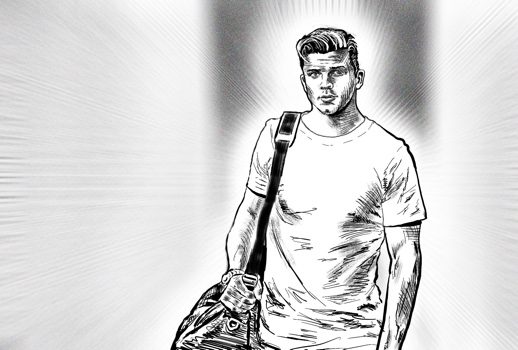
“I’ll bet none of these no-hopers will ever appear onstage,” Evan thought.
Reaching Porky’s, the gargantuan dance rehearsal galleria on 880 Broadway, meant catching the B train downtown from Columbus and switching at 34th to the Q, or riding the C down to Chelsea and then swapping for the L.
That is, of course, if your point of departure on Sunday morning was in Hell’s Kitchen, which, for Evan Ingersoll, it was. After an early Saturday shift bar-backing at Aura Bar, that shitty dumpster fire on 53rd and Ninth, Evan had trotted over to his friend Jesús Halévy’s for a late-night slumber party à deux. A couple rounds of Salty Chihuahuas, and it wasn’t long before the two were re-screening the 1986 Academy Awards in Jesús’ bedroom.
“What do you suppose Marlee Matlin is up to right now?” Jesús wondered aloud the next morning as he watched Evan roll out of his vibrating futon and pull on some jeans.
“Right this minute? Oh, probably peeping out of an armoire somewhere in her police officer hubby’s poolside cabana in Burbank, clutching her statuette, and waiting for him to bounce so she can finally emerge for some soundless jazzercise.”
“Best deaf day ever!” Jesús laughed. “God, why’d she ever leave the movies?”
“I guess she figured it was time to, uh, sign off? At least until her turn on The Apprentice…”
Suddenly, Evan was missing his tee-shirt.“Hey, do you have something I could wear to my rehearsal?”
“Sure, but baby, honestly. You really gotta cool it with the mopping.” Jesús moved to his dresser. “Mira, pónte esta.”
Evan accepted the replacement garment and studied himself in his friend’s full-length mirror. At 29, he evinced the kind of tart, lopsided confidence that one can only acquire from dropping out of college and hustling on the New York bar circuit for a few years. A pair of slate blue eyes, the devil’s cleft chin, that angular face: he had the bearings of a heartthrob—he’d once been told he smacked of a young Maxwell Caulfield—if for that pate of 1960s Fabian hair, a styling choice he knew wasn’t for everyone. If only he could bring himself to swipe right on a hipster.
“I’ll take it,” he declared, turning to Jesús.
A half-hour later Evan would be standing alone on the crowded weekend C train, headed downtown for his first-ever rehearsal as a supernumerary for the Big Apple Singing Theater Association’s upcoming production of Bison Don’t Cry by composer Zack Wedgie. (Claiming he had an errand to run, Jesús had tagged along for a few stops, then hopped off in upper Chelsea.)
I’ll bet none of these no-hopers will ever appear onstage, Evan thought, surveying his unsuspecting fellow travelers aboard the train and feeling an ember of pride grow red-hot in his chest. Bwahahaha.
It wasn’t until he transferred to the L that he noticed he’d split his black jeans when putting them on.
Located on the edge of Gramercy Park, Porky’s was a brick prewar rehearsal building that might have been torn down if it weren’t for the New York Historical Society’s recent concern for it as a landmark locus of entertainment. Housing ten dance studios, as well as a large black box in the basement, its five floors had once lent a home to Ziegfeld, Hurok, and Balanchine. Legend had it that Jerome Robbins had thrown a highball at one of his hoofers on the second floor. The complex flights of stairs to the basement were a well-known Studio 54 pregaming location for Liza, Gelsey, Faye, and Bianca Jagger.
Of course the truth was that BASTA could barely afford to rent the space for its rehearsals. But general manager Joey Piccata knew the right people, and a couple of backdoor deals (“the board doesn’t need to know everything, goddammit”) had enabled his company to secure one of Porky’s smaller rooms on the fourth floor.
Evan couldn’t believe he’d managed to make it a bit early. So right before entering the building, he turned on his heel and sprinted across Broadway to a cater-cornered cafe called “Croissants Bonanza.”
“Evan, over here!”
The place was busy enough that Evan had to search for a moment to find the voice. Then his eyes landed on Gus Rippon, his friend from auditions, standing by the sugars with two other tall men.
“Oh hey, Gus,” said Evan. “You made it.”
“Well, I gotta confess I almost pulled out after my friend sent me that takedown in The Village Void about Fanciulla. Didja catch it?”
“I did.”
“Awfullllllll!!” Gus’ eyes fluttered impishly. “Hey, have you met these guys?”
Evan glanced at the other two and stuck out a hand. “I haven’t, actually. But I think I sort of remember you from auditions?”
“Boys,” said Gus with a wink. “Introducing Evan Ingersoll.”
The lanky one to Gus’ left giggled as he caught Evan’s palm. “Hey Evan. Timothy Hanglewass. I sort of remember you, too.”
“Timothy’s a dancer who says he’s never heard an opera before,” said Gus. “But we don’t believe that for an second.”
“I’m more into musicals,” Timothy shrugged. “I heard this was happening and—”
“This is also Timothy’s first time as a supernumerary,” Gus added, flirtatiously cutting him off. “Looks like they took a lot of us in from the street. Except for this hottie, right Nixon? You’re an old-timer.”
Gus pinched the tricep of the third in the group, a well-built, darkly-complected man with a Grecian nose Evan remembered from February callbacks. Fuckkk. Evan saw pectoral muscles beneath a sweatshirt and knew instinctively to play it casual.
“Old as dirt,” said Nixon Ben Mahmoud. “And I do like opera a lot. Especially Zack Wedgie’s work.”
“Oh?” said Evan. “Are you in a lot of shows?”
“Been in a few. Like that ‘awfulllll’ Fanciulla nobody likes, for instance.”
“Wow.”
“Isn’t that wild?” exclaimed Gus, grabbing the supernumerary regular around the shoulder. “And now he’s about to do Bison Don’t Cry. Two cowboys in one season!”
“So… I guess you do this full-time?”
“Hardly,” said Nixon, pulling away from Gus. “I’m in development at the Architecture Museum uptown. This here is just a hobby.”
“Nice to meet you guys.”
“And they’re so very pleased to meet you, Evan. Listen, I think we gotta head over, right?”
Nixon tossed his coffee in the trash and swung next to Timothy as the two vamoosed from Croissants Bonanza.
“Nice, right?” Gus said to Evan, lowering his voice. “I guess we’ll be seeing the other six supers inside.”
“Very nice. But how do you know these guys? I don’t remember you approaching them at callbacks?”
“Oh you best believe I was stalking them both on Instagram after auditions,” said Gus. “We’ve been texting all week!”
A few avenues over, a man-child in his late-20s was meeting his father for Sunday brunch at Blue Beaver for the first time since a seismic personal announcement had threatened to convulse the family out of alignment.
He wasn’t thrilled about it, but Jesús was keeping good on his promise to Concepción that he would talk to Shmuelina.
“My new place is petite, but not all-around awful,” Shmuelina said, daintily prodding at his eggs. His smile, Jesús thought, looked forced, as though he were trying to convince himself. “And I get lots of sunlight through my windows.”
“Where exactly is this place, dad?”
“Inwood. And I tell you, it’s a steal. I just wish there were more trains running on weekends so I could come down and see you.”
Jesús sighed. “Well, then see how about you see me on a weekday?”
“If only it could be that easy. All of my days are filled with mess lately, Jesús. A groys balagan. Psychiatrist, lawyer, doctor visits. And then my clients, several of whom I tell you gave up on me when they saw that I’d chosen to be myself. I’ve had to find new ones.”
“You should be yourself, dad.”
“Peddling property isn’t easy as a man,” confessed Shmuelina. “It’s harder as a woman.”
“Well, like I said, we’re all here to support you.”
A fog blew across Shmuelina’s face. “If only that were true. Your mother isn’t speaking to me. I know she sent you to talk some sense into me about my… change…”
“She wanted me to talk to you, right. But I’m my own man, dad. I draw my own conclusions about things. Anyhow, I know a lot of people who would consider what you’re doing right now something brave.”
“Oh yeah? Well, ‘brave’ isn’t what I’d call it. I’d call it necessary. Like I don’t have a choice. Never had one.”
Listening to his father, Jesús was struck by how different everything sounded—the voice more tenorial, the near-coquettish gestures, even when discussing his wife—and despite his encouragement, Jesús wasn’t sure he was totally on board with the change. He felt weird for feeling weird, though. A more sophisticated son, he worried, would likely be capable of delivering more than a few rote platitudes about how everything would be fine, his mother was fine, the family was fine, society was going to be okay. Jesús knew we should probably be asking more questions.
But he was still processing, and was it a problem if he didn’t feel entirely ready for that sort of intimacy? And yet his own hesitancy surprised him: Jesús was a progressive queer of the future, after all. Identity was as important, perhaps more important, than familial ties. So where did this unease come from?
“Okay, not brave then. And no, no, of course you didn’t have much of a choice, dad.”
Shmuelina looked at his son. “Listen, I know this is going to take us some time. But I believe this can bring us closer, you and I.”
“For sure.”
“And part of this closeness means helping the family, okay?”
“Of course,” nodded Jesús, though he wasn’t quite sure what this meant.
Shmuelina looked up from her plate. “I need you to help me track Consuela down.”
“Wait, what?!” Jesús couldn’t believe it. His sister had been estranged from the family for over a decade—last he’d heard, she was dancing somewhere in Akron. “Are you sure about this?”
“I’m positive. I’ve been thinking: I’d like to find her, come out to her, show her who I am, and maybe restart our relationship. But I’ll need your help, Jesús.”
“I mean, I can try,” said Jesús, masking his reluctance with mettle. “As a gay man, I of all people should know how important coming out is. I’ll do what I can to help you.”
“Wait,” said Shmuelina, dropping her napkin. “You’re… gay?
Illustration by Ben A. Cohen



